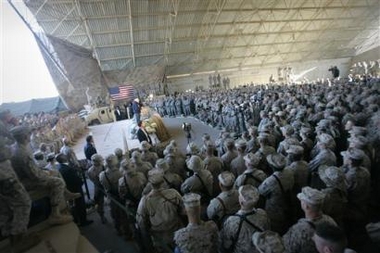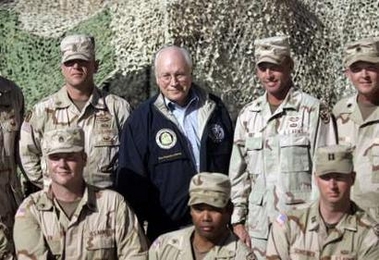|
Cheney visits Iraq amid surge of violence
(AP)
Updated: 2005-12-19 08:32
Suicide bombers and gunmen killed nearly two dozen people across Iraq on
Sunday, shattering the relative quiet since the parliament election, as Vice
President Dick Cheney made a surprise visit and suggested the vote could pave
the way for beginning a U.S. pullout.
Germany's government, meanwhile, said kidnappers had freed a German woman who
was taken hostage in northern Iraq more than three weeks ago. Susanne Osthoff, a
43-year-old aid worker and archaeologist, was reported in good condition at the
German Embassy in Baghdad.

U.S. Vice President Dick Cheney addresses the
Marines at Al-Asad Air Base, Sunday, Dec 18, 2005, in Iraq.
[AP] | A series of attacks that began late
Saturday ended three days of near calm that began with Thursday's elections for
the first full-term parliament since Saddam Hussein's was toppled.
Most of the people killed in the new violence, which included two suicide
bombings, were police officers. The bloodshed came after authorities eased
stringent security measures ordered for the elections and traffic returned to
normal on the first full working day since the vote.
Cheney's visit, under heavy security, was so secret that Iraqi Prime Minister
Ibrahim al-Jaafari was surprised when he met him at the U.S. ambassador's
residence in the heavily fortified Green Zone.

U.S. Vice-President Dick Cheney poses with
U.S. soldiers at the Taji Air Base in Iraq December 18, 2005.
[Reuters] | Coming just hours before President
Bush's address on Iraq, Cheney's one-day stop focused on the successful
legislative election and the strong turnout in all of Iraq's religious and
ethnic communities.
"The participation levels all across the country were remarkable," Cheney
told reporters after an hourlong briefing from U.S. military commanders. "And
that's exactly what needs to happen as you build a political structure in a
self-governing Iraq that can unify the various segments of the population and
ultimately take over responsibility for their own security."
The big turnout åK½ï¿½ particularly among Sunni Arabs who boycotted the election
of an interim legislature last Jan. 30 åK½ï¿½ has raised expectations that increased
political participation may undermine the Sunni-led insurgency and allow U.S.
troops to begin pulling out next year.
But Cheney stressed the Bush administration did not plan a rapid withdrawal.
"You've heard some prominent voices advocating a sudden withdrawal of our
forces from Iraq," he told hundreds of troops. "Some have suggested that the war
is not winnable and a few seem almost eager to conclude the struggle is already
over. But they are wrong. The only way to lose this fight is to quit and that is
not an option."
Cheney met with Iraq's leaders and military commanders in the Green Zone, saw
an Iraqi troop training demonstration at Taji air base, lunched with soldiers
and gave a speech to troops.
Al-Jaafari told Cheney that he estimated a record 70 percent of Iraq's 15
million registered voters went to the polls. He also described this year as "the
most important in Iraq's history."
"We have been able to move forward several decades. The year 2005 is the most
important in the history of Iraq in terms of productivity, of the establishment
of the democratic process, the establishment of the constitution, the
establishment of the Iraqi parliament," he said.
|